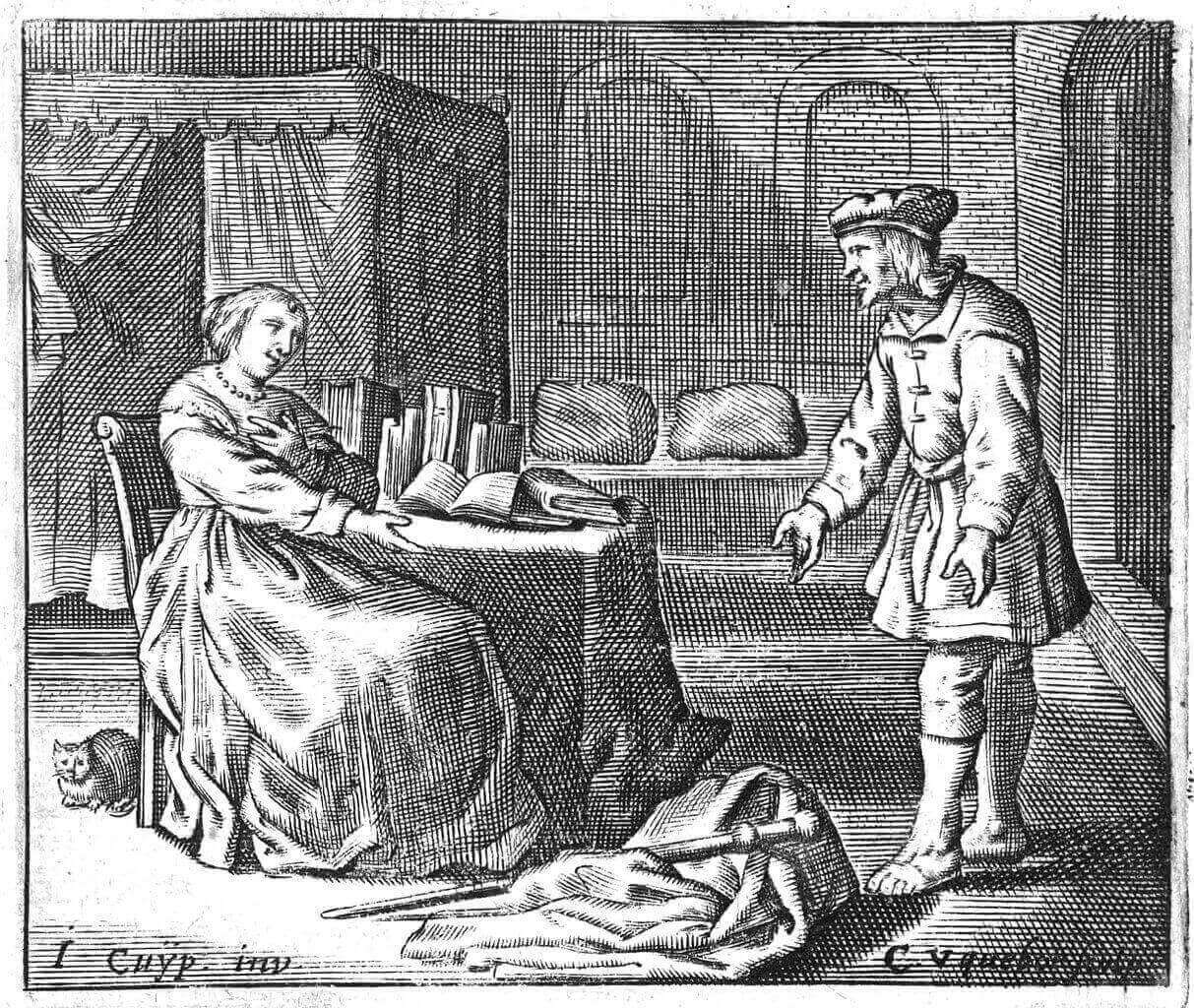Living the Cynic Life
Somewhere between a philosopher, a comedian, and an activist, Hipparchia of Maroneia was one of the most significant early philosophers in the Cynic school founded by Diogenes. She was born some time around 350 BCE in the Thracian village of Maroneia, but when she was still young, she moved with her family to Athens. Her background was privileged and wealthy. However, along with her brother Metrocles, once in Athens, she became involved with the Cynic philosophers.
The Cynics were a school who scorned the values of their peers, and Hipparchia’s philosophical embrace of Cynicism led to her turning her back on her life of privilege, taking up a more challenging and controversial lifestyle.
Dog-coupling
Against her parents wishes, Hipparchia married Crates, the hunch-backed student of Diogenes (and first philosophy teacher of Zeno of Citium). By the time of their marriage, Crates was already old. The story in Diogenes Laërtius is that Hipparchia’s parents wanted to prevent the marriage. Crates himself agreed to try to put her off by stripping off to stand naked in front of her, saying:
Here is your husband… and here is all he owns. So consider carefully, because you cannot be my partner unless you are prepared to adopt my ways. [1]
Hipparchia, contrary to her parents’ hopes, liked what she saw, so she and Crates married. From that point on, they took up the Cynic lifestyle, much of the time living rough, their only possessions the Cynic robe, satchel, and staff. In one later account, Hipparchia claims,
Instead of the role of a fashionably dressed woman, I, Hipparchia, chose the Cynics’ uniquely demanding way of life. I don’t care for shawls secured with clasps, high-heeled leather shoes, or fancy fillets to hold my hair in place. Supplied with barley meal, supported by my staff, with my doubled cloak that serves for dress by day, at night as bedding on the rocky ground… [2]
Later accounts also claim Crates and Hipparchia often had sex in public, something Crates referred to as kynogamia: dog-coupling, or simply dogging. Some commentators have claimed this is an invention of later critics, seeking to bring the Cynics into disrepute; but it is consistent with the teaching of Crates’ own teacher Diogenes, who had a fondness for public masturbation, and with the Cynic determination to live in accord with nature, even if it caused public scandal.
The double act
Marriage was one of the social conventions rejected by the Cynics; so the Cynic-inspired marriage of Crates and Hipparchia was controversial not only among the opponents of the Cynics, but also within Cynic circles. However, Crates and Hipparchia became a regular double-act in Athens, and their unconventional lifestyle allowed them to challenge many of the social assumptions of their time. They messed with ideas about men’s and women’s social roles; and they also used the relative freedom from restraint brought by their unconventional lifestyle to act as philosophical counsellors to their fellow citizens.
Hipparchia is said to have written several Cynic works, including Philosophical Subjects, and Explorations and Questions for Theodorus the Atheist; but none of these works have survived. She and Crates also raised two children, a boy and a girl, in the Cynic lifestyle.
Hipparchia died sometime in the first half of the 3rd century BCE, although we know nothing about the manner of her death.
On Shamelessness and Comedy
Shamelessness
We don’t have any complete contemporary accounts of Hipparchia’s life. However, the stories about her often associate her with the Cynic idea of anaideia, or “shamelessness.”
For the Cynics, shamelessness was something to be deliberately practised as a way of challenging the moral norms of society. Shame was an impediment to the main goal of the Cynic life: living in accord with nature. But this shamelessness was not a rejection of ethics. For the Cynics, shame or aidōs is a problem precisely because it masquerades as ethics, but isn’t.
To be shameless is not to be unethical, even if it might be judged so by one’s peers; it is instead to break with the cultural norms that regulate not only individual bodies and lives, but also whole societies.
Philosophy as comedy
In one famous story, Hipparchia and Crates turn up at a symposium. This is already a scandal because, in Ancient Greece, drinking parties are usually attended only by men. One of the other guests, Theodorus, protests at her presence. And Hipparchia responds with what in Greek was known as a spoudogeloion. The word spoudogeloion combines both the word spoudaion, or “serious”, and geloion, or “comic”. So a spoudogeloion is a comic argument that serves nevertheless to push home a serious point.
Hipparchia’s opens by arguing that if something is permissible for Theodorus, it is also permissible for Hipparchia. If men can attend symposia, she argues, why not women? There’s a wider point here as well. For the Cynics, questions of good and bad must be universally true, rather than applying only to women or to men, or to members of a particular culture or social class.
But then things get interesting as Hipparchia makes a comic turn. It is not wrong, she says, for Theodorus to punch himself. At this point in the story, you have to imagine them arguing in context: with Hipparchia playing the crowd at a boisterous drinking party. And if it is not wrong for Theodorus to punch himself, Hipparchia argues, and if what is permissible for Theodorus is also permissible for Hipparchia, she concludes that it is not wrong for her to punch him.
Like many jokes, perhaps you had to be there. But you can imagine the roars of laughter as Theodorus is put in his place. It is not entirely clear from the story whether Hipparchia follows through and punches the annoying Theodorus. But it seems likely because in the debacle that follows, Theodorus tries to strip her of her Cynic robe.
Renouncing the loom
For Theodorus, removing Hipparchia’s robe serves a double function: first, it removes the source of her authority because the Cynic robe identifies her as a philosopher; second, it attempts to shame her into silence. However, Theodorus has woefully misread the situation. Hipparchia, after all, is a Cynic. She has embraced shamelessness; and she has given up on social notions of shame and honour, knowing that these notions have little to do with ethics. So, the story says, Hipparchia simply shrugs off her nakedness, showing “no signs of a woman’s alarm or timidity.”
Theodorus then resorts to gender stereotypes, pouring scorn on Hipparchia for leaving her loom, traditionally the domain of women. Unsurprisingly, Hipparchia is unimpressed. “Don’t suppose for a moment,” she says acidly, “that I regret the time I spend improving my mind instead of squatting by a loom.” [3]
Here lies the genius of Hipparchia. Across much of the ancient world, the role of women was reduced to the domestic sphere, while philosophy was seen as a public activity. Despite this, Hipparchia fearlessly makes a claim for women’s voices within the public sphere. Two other early women philosophers elsewhere in the world — Jing Jiang in China, and Gārgī Vācaknavī in India — also used the rhetoric of weaving to claim legitimacy when engaging in philosophical debate. But Hipparchia goes one further than either of these thinkers, and in her spat with Theodorus refuses outright the cultural assumption that women should give their attention only to weaving. In doing so, she makes an argument for Cynic universality.
Notes
[1] The Cynic Philosophers from Diogenes to Julian, ed. Robert Dobbin (Penguin 2012), p. 54
[2] ibid.
[3] ibid.
Further Reading
Books
William Desmond’s Cynics (Acumen 2008) is a good overview of Cynic philosophy.
Online Resources
The Internet Encyclopedia of Philosophy has a great overview of Hipparchia’s life and thought.
Read the Looking for Wisdom blog piece on Gārgī, Jing Jiang, Hipparchia, and weaving the net of argument.



